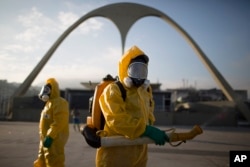There's no looking back now.
With one week to go until the 2016 Summer Olympics, host city Rio de Janeiro is rushing to finish its final preparations to receive an influx of hundreds of thousands of tourists and world-class athletes — and holding its breath for the three weeks to follow.
The games are taking place as Brazil struggles with a deep economic recession, rampant corruption and an embattled president facing a pending impeachment trial. Rio itself is coping with the displacement of the city's poorest residents, a Zika virus outbreak, and waters where Olympic athletes will compete polluted by noxious sewage.
It would seem the most inauspicious start for the world's premier athletic competition. Nor are the Olympics expected to alter Brazil's fortunes.
Neil Shearing, chief emerging markets economist at Capital Economics Ltd., tells VOA that Brazil's economy may have already reached the bottom, and the Olympics are unlikely to affect it — negatively or positively.
"You're talking … somewhere between 300,000 to 400,000 additional tourists coming into a country of 200 million people, to a city that gets millions of tourists each year," Shearing explained. "We've crunched the numbers. We think the additional spending might add something like 0.03 percent to GDP [gross domestic product]."
Most new job creation, he added, will be temporary.
"There will be lots of short-term labor jobs, service sector jobs, so hotels will hire, restaurants will hire, street vendors will hire. And then those workers will be laid off, presumably, once the games finish," Shearing said.
Most major studies of these mega-events point to a similar conclusion: The benefits rarely, if ever, outweigh the costs of hosting the Olympics or the World Cup.
Shearing notes that in cases touted as "successes," such as London in 2012 or Barcelona in 1992, urban regeneration — construction of infrastructure, shops and restaurants in otherwise neglected areas — resulted in a "spark," yet did not have any discernible impact on GDP.
Mass evictions reported
The three-week event is likely to highlight the country's financial woes, as well as focus attention on the enduring hardships of its poorest residents, many of whom lack adequate housing, health care, nutrition, education and transportation.
As reported by The Guardian, major human rights violations including poor labor conditions, police violence, and forced evictions to make way for Olympics-related construction projects have been cited by Comité Popular, a committee composed of NGOs and academics.
Human rights NGO Terre des Hommes claims more than 4,000 families have been evicted in Rio de Janeiro, and many more threatened, because of the games. As a result, according to the NGO, many children can no longer attend school or access basic social services, and are placed at higher risk of exploitation and sexual violence.
Rio authorities have responded to some of these concerns. In March, Rio's mayor, Eduardo Paes, spoke about eviction fears at one of the most affected neighborhoods, Vila Autodromo, which is the site of city's Olympic Park.
"We have always said those who want to stay can stay," Paes said. "We're not going to make victims out of those who are not victims."
Risks of infection
Political and economic uncertainty aside, athletes and tourists alike risk being infected by the Zika virus or Methicillin-resistant Staphylococcus aureas (MRSA), a bacterial infection caused by Rio's notoriously polluted waters along its scenic beaches and bay.
Laurie Garrett, senior fellow for global health at the Council on Foreign Relations, believes fears over the Zika virus pale in comparison to those of MRSA, which she notes has a 100 percent infection rate for anyone immersed in water for one hour without wearing protective gear.
"Winter has come, the mosquitoes are going into hibernation, and we've seen a dramatic reduction from 8,000 Zika cases identified weekly in May, to now less than 200 a week," Garrett said. "Similarly, I think both dengue and chikungunya peaked in May and have really declined since."
The polluted ocean and insufficient health infrastructure, in her opinion, are greater causes for concern.
"Given the state of the hospitals and the lack of payment for health care workers, if we had a traumatic injury event ... Brazil would be hard-pressed to meet capacity and guarantee the health and safety of everybody involved," she said.
The probability of being infected by a mosquito carrying Zika during the Olympics is also estimated to be low by the European Centre for Disease Prevention and Control. But the agency notes the risk of contracting Zika "cannot be excluded."
The World Health Organization, furthermore, suggested that either canceling or changing venues of the games would "not significantly alter" the spread of Zika across international borders.
Still, optimism
Overall, Olympic officials are expressing confidence about the games. The Los Angeles Times quotes Nawal Moutawakel of the International Olympic Committee's coordination commission as saying the city is ready to host the Olympics, despite lingering problems.
"From views of the Corcovado and Sugar Loaf Mountain to the new state-of-the-art facilities in Barra or Deodoro and the iconic Maracanã Stadium and Copacabana Beach, I cannot imagine more spectacular backdrops for the world's top sportsmen and women to showcase their talents to a watching world," Moutawakel said.
Others are more cautious, and are waiting to see what happens.
"I have a feeling that when all is said and done, and we get to the end of the Olympics at the end of August, there will be a big sigh of relief and a sort of wiping of the brow," said Garrett, referring to the buildup of global health fears.
Rio's athletes and spectators hope so, too.















